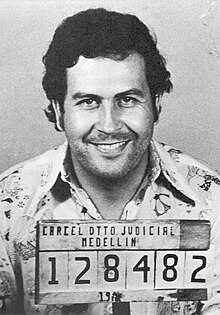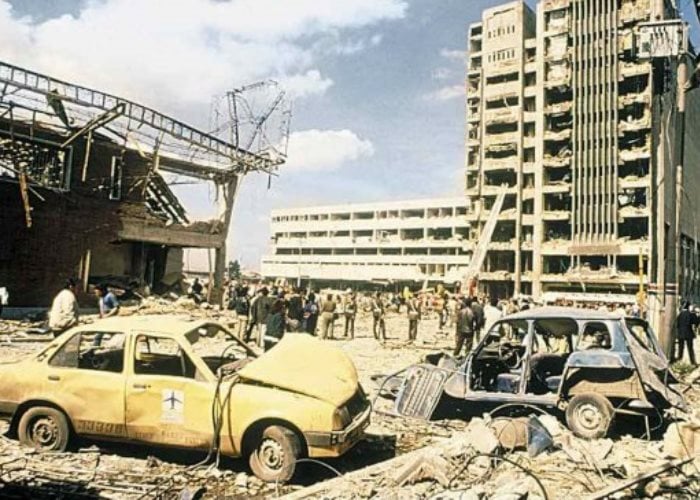Some months ago I went to the New York Fire Department store in Manhattan to buy some stuff for my brother and my nephew, who are firemen in Bogota, Colombia; and the clerk told me he had read a book about Pablo Escobar and asked me whether the drug dealer was as bad as he is said to be or was good as some people say. I responded to the clerk, from my point of view, Escobar was evil and the help he provided the poor did not by far reimburse his criminal acts.
 The point is that when non-Colombian people around the world learn you are Colombian most of them think immediately of drug traffic and Pablo Emilio Escobar, known also as El Patron (The Boss). It is a sentence or curse we Colombians have had to bear due to the huge illegal exportation and extraordinary profitable cocaine business in the last decades, especially in the 80´s, and the news, books, movies and series made about Escobar´s life and death. One of those movies is a documentary named ´Pablo Escobar, angel or demon´, from the name of this writing derives.
The point is that when non-Colombian people around the world learn you are Colombian most of them think immediately of drug traffic and Pablo Emilio Escobar, known also as El Patron (The Boss). It is a sentence or curse we Colombians have had to bear due to the huge illegal exportation and extraordinary profitable cocaine business in the last decades, especially in the 80´s, and the news, books, movies and series made about Escobar´s life and death. One of those movies is a documentary named ´Pablo Escobar, angel or demon´, from the name of this writing derives.
I was a child and a teenager in the 80´s and early 90´s and remember when politicians, judges, journalists military men and policemen were assassinated; buildings, cars and even an airplane blown up with hundreds of casualties, All attributed to and most of it appropriated by El Patron. It also comes to my mind when Escobar turned himself in to the Colombian government, build himself a sophisticated prison called La Catedral (The Cathedral), subsequently escaped from it and was finally tracked out, found and supposedly taken down by the known El Bloque de Búsqueda (The Search Bloc).
It was a dark time, we Colombians used to live with fear. Our every day life, mine among home, school and neighborhood; was touched by Escobar´s attacks and the appearance of the victims. Terrorism became a part of our lives and we were getting used to it. In the other hand, many people claimed the were having been helped by El Patron, so that they respect him and even love him. Some of them became even proud of the way Escobar was supposedly cornering the Colombian government and evading the American.
In my opinion, as I wrote above, what Pablo Escobar did was extremely bad, not only for his victims, their families and relatives, but for the country, the generations who witnessed his acts, the world and especially for those who consumed the drugs he trafficked and the ones who died in the war provoked by the business. The wellness he did compared to his crimes is nothing, since only few people were able to take advantage of Escobar help. At the end of the day, the money of Pablo was spotted with blood.
Because of all of this, when you think of Colombia do not think of drugs or Pablo Escobar. If you do, that could suggest your general knowledge is not good enough to know about more other facts about this country such as the coffee and emerald production, its Literature and Peace Nobel Prizes, its artists and sportspeople and many other good things Colombia offers. Think of good things even when part of the entertainment industry is focused in showing narcotraffic world as attractive and dealers such as Pablo Escobar as heroes.
 The point is that when non-Colombian people around the world learn you are Colombian most of them think immediately of drug traffic and Pablo Emilio Escobar, known also as El Patron (The Boss). It is a sentence or curse we Colombians have had to bear due to the huge illegal exportation and extraordinary profitable cocaine business in the last decades, especially in the 80´s, and the news, books, movies and series made about Escobar´s life and death. One of those movies is a documentary named ´Pablo Escobar, angel or demon´, from the name of this writing derives.
The point is that when non-Colombian people around the world learn you are Colombian most of them think immediately of drug traffic and Pablo Emilio Escobar, known also as El Patron (The Boss). It is a sentence or curse we Colombians have had to bear due to the huge illegal exportation and extraordinary profitable cocaine business in the last decades, especially in the 80´s, and the news, books, movies and series made about Escobar´s life and death. One of those movies is a documentary named ´Pablo Escobar, angel or demon´, from the name of this writing derives. I was a child and a teenager in the 80´s and early 90´s and remember when politicians, judges, journalists military men and policemen were assassinated; buildings, cars and even an airplane blown up with hundreds of casualties, All attributed to and most of it appropriated by El Patron. It also comes to my mind when Escobar turned himself in to the Colombian government, build himself a sophisticated prison called La Catedral (The Cathedral), subsequently escaped from it and was finally tracked out, found and supposedly taken down by the known El Bloque de Búsqueda (The Search Bloc).
It was a dark time, we Colombians used to live with fear. Our every day life, mine among home, school and neighborhood; was touched by Escobar´s attacks and the appearance of the victims. Terrorism became a part of our lives and we were getting used to it. In the other hand, many people claimed the were having been helped by El Patron, so that they respect him and even love him. Some of them became even proud of the way Escobar was supposedly cornering the Colombian government and evading the American.
 |
| www.elespectador.com |
In my opinion, as I wrote above, what Pablo Escobar did was extremely bad, not only for his victims, their families and relatives, but for the country, the generations who witnessed his acts, the world and especially for those who consumed the drugs he trafficked and the ones who died in the war provoked by the business. The wellness he did compared to his crimes is nothing, since only few people were able to take advantage of Escobar help. At the end of the day, the money of Pablo was spotted with blood.
Because of all of this, when you think of Colombia do not think of drugs or Pablo Escobar. If you do, that could suggest your general knowledge is not good enough to know about more other facts about this country such as the coffee and emerald production, its Literature and Peace Nobel Prizes, its artists and sportspeople and many other good things Colombia offers. Think of good things even when part of the entertainment industry is focused in showing narcotraffic world as attractive and dealers such as Pablo Escobar as heroes.
Comments
Post a Comment